|
|
|
Sort Order |
|
|
|
Items / Page
|
|
|
|
|
|
|
| Srl | Item |
| 1 |
ID:
105338
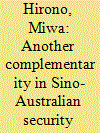

|
|
|
|
|
| Publication |
2011.
|
| Summary/Abstract |
This paper examines how China has played a "responsible" role in international humanitarian post-disaster assistance by taking the example of China's assistance to post-tsunami Aceh, and explores policy implications with regard to future Sino-Australian security cooperation. China and Australia took inconsistent approaches to assistance in Aceh, which derived from their different understandings of international "responsibility". However, the inconsistencies do not necessarily hamper cooperation between the two. Rather, it is because of these inconsistent approaches that the two countries' cooperation can develop into comprehensive and multifaceted assistance. The key to successful cooperation between the two countries, this paper argues, is the notion of "complementarity". In policy documents on bilateral relations, Chinese and Australian policymakers emphasize the "economic complementarity" between the two, but this "complementarity" is also useful when the two explore the way in which they will cooperate on security issues. One example of this complementary approach with regard to assistance for Aceh is the Australian effort to promote stability in both tsunami and non-tsunami affected areas, and Chinese economic investment in Aceh, in keeping with the Acehnese local expectations of long-term economic development and more employment opportunities, which are the foundation stones of stability. While these efforts are not consistent, they are highly complementary to each other, and have great potential to encourage peace and stability in Aceh.
|
|
|
|
|
|
|
|
|
|
|
|
|
|
|
|
| 2 |
ID:
105337
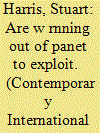

|
|
|
|
|
| Publication |
2011.
|
| Summary/Abstract |
Many people have begun to concern about the potential resources shortages against the backdrop of rapid economic growth. Paul Krugman wrote an article titled 'Running out of Planet to exploit', and in this article, the author will address the Krugman question, and to consider whether the key factor is the decision-making capacity of the international community in dealing with and adapting to the substantial interactions between energy, land, water, and food supply, and the potential global resource scarcities in these four areas-the links and limits in the paper's title.
|
|
|
|
|
|
|
|
|
|
|
|
|
|
|
|
| 3 |
ID:
105336
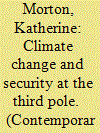

|
|
|
|
|
| Publication |
2011.
|
| Summary/Abstract |
The consequences of global climate change present a serious strategic challenge in one of the most remote parts of the world. The Tibetan Plateau is the largest high-altitude landmass on earth, with more than 45,000 glaciers that feed the major river systems in Asia, which, in turn, support 40 per cent of the world's population. Temperatures in the region are rising twice as fast as the global average, posing serious risks to hydrological systems, agriculture, and critical infrastructure. Looking at regional cooperation through the lens of ecological security raises important questions about the extent to which the threat of large-scale climate-related disaster could trigger new forms of cooperative action. The sobering reality is that current responses fall far short of ensuring a mutually secure future.
|
|
|
|
|
|
|
|
|
|
|
|
|
|
|
|
| 4 |
ID:
105333
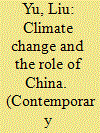

|
|
|
|
|
| Publication |
2011.
|
| Summary/Abstract |
Action to combat climate change is becoming ever more essential, especially as nations look toward their futures in an increasingly competitive world. Countries vie for obtaining the largest reduction in carbon emissions while the need for cooperation is also taking on ever-greater urgency. China has so far actively, solidly and diligently demonstrated its responsible image towards climate change, a point which should be understood and recognized by the developed world.
|
|
|
|
|
|
|
|
|
|
|
|
|
|
|
|
| 5 |
ID:
105341
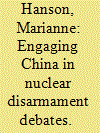

|
|
|
|
|
| Publication |
2011.
|
| Summary/Abstract |
China has demonstrated some interest in the resurgence of nuclear disarmament debates over the past few years, but because its own nuclear arsenal is relatively small, because this capability is predicated on a very specific Chinese posture and security concerns, and because it believes firmly that the responsibility for moving towards a world without nuclear weapons belongs in the first instance to the United States and Russia-who between them possess 95% of the world's existing nuclear weapons-it has displayed a somewhat limited contribution to this debate so far.
|
|
|
|
|
|
|
|
|
|
|
|
|
|
|
|
| 6 |
ID:
105335


|
|
|
|
|
| Publication |
2011.
|
| Summary/Abstract |
The issue of food security is a complex one, and, with the advancement of globalization, it is becoming ever more urgent. And as climate change rises to the top of the international agenda, the securitization of food issues is growing more complex. It has turned the spotlight on the issue of food security and introduces new challenges to every nation. Historically, China has been an agricultural country, and thus has always been concerned about food security, enacting various measures and policies over the years to protect its food supply. However, there are inherent uncertainties and many challenges in this area. To deal with the problem of food security caused by global climate change, China and other nations should rethink how they deal with food security, and establish a comprehensive food security strategy which engages with other strategies in economic development, agriculture and rural development, energy, water security and social development.
|
|
|
|
|
|
|
|
|
|
|
|
|
|
|
|
| 7 |
ID:
105339
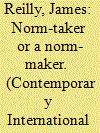

|
|
|
|
|
| Publication |
2011.
|
| Summary/Abstract |
As China expands its official development assistance (ODA) in Southeast Asia, is Chinese aid beginning to emulate international norms and practices or instead establishing its own distinct approach to development assistance? This essay argues that China's socialization into international norms varies with the thickness of the institutional environment. In Cambodia and Laos, China's aid program shows signs of alignment with international aid practices. At the regional level, however, China is beginning to act more like a norm-maker. Through expanding its financial support for select regional initiatives, Beijing is bolstering its ability to shape the norms and practices of regional developmental institutions. China's rising ODA in Southeast Asia poses a potential challenge to Australia's influence in the region, but also provides opportunities for greater diplomatic engagement and cooperation in support of regional development.
|
|
|
|
|
|
|
|
|
|
|
|
|
|
|
|
| 8 |
ID:
105332


|
|
|
|
|
| Publication |
2011.
|
| Summary/Abstract |
A nuclear weapons-free world (NWFW) has been advocated and welcomed recently. However, the realization of a NWFW is quite difficult. The author believes that it is more realistic to build a nuclear weapons-free zone (NWFZ) than it is to build a NWFW, at least in the short term. She analyses the significance of NWFZs and issues confronting the existing zones and pointed out how to create more NWFZs.
|
|
|
|
|
|
|
|
|
|
|
|
|
|
|
|
| 9 |
ID:
105343
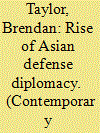

|
|
|
|
|
| Publication |
2011.
|
| Summary/Abstract |
The rise of multilateral defense diplomacy in Asia is an important new phenomenon. In addition to the newly established ADMM+ process and the Shangri-La Dialogue (SLD), ASEAN defense ministers, ASEAN chiefs of defense and ASEAN chiefs of intelligence are now all meeting on a regular basis. Such gatherings were almost unthinkable as recently as a decade ago. This paper seeks to interpret these developments and their implications for the Sino-Australian security relationship. It argues that while these recent developments appear to reflect a deepening of Asian security cooperation, they are actually a manifestation of an intensifying institutional competition, namely between the ASEAN-centered ADMM and the Western-backed SLD. This, in turn, is symptomatic of a broader institutional contestation--reflecting underlying strategic competition--which is becoming a distinctive feature of Asia's emerging security 'architecture.' The paper goes on to argue that China and Australia find themselves on opposite sides of this competition and, particularly in the area of defense diplomacy, are likely to become increasingly important players in fuelling it. The paper concludes by observing why such a dynamic is potentially problematic and offers a modest set of policy recommendations designed to assist Beijing and Canberra in addressing and alleviating their competitive tendencies.
|
|
|
|
|
|
|
|
|
|
|
|
|
|
|
|
| 10 |
ID:
105334


|
|
|
|
|
| Publication |
2011.
|
| Summary/Abstract |
The refugee issue is a thorny problem for the Australian government. In recent years before each general election, both the ruling party and the opposition would take advantage of refugee policies to attract votes. As a matter of fact, the refugee issue not only challenges Australian politics, but also Australian foreign relations, especially in the relationship between Australia and East Asian countries. This paper will focus on the influence of the refugee issue on Sino-Australian relations and try to make the recommendation that East Asian nations should resolve the issue by deepening regional cooperation through the AESAN Regional Forum (ARF).
|
|
|
|
|
|
|
|
|
|
|
|
|
|
|
|
| 11 |
ID:
105342


|
|
|
|
|
| Publication |
2011.
|
| Summary/Abstract |
An arms race in space among the major powers would be immensely dangerous, destabilizing, and expensive. Russia, which has a long history in space technology dating back to Sputnik in 1957, does not have the resources or the political will to sustain such a race today. But China and the United States do.
|
|
|
|
|
|
|
|
|
|
|
|
|
|
|
|
| 12 |
ID:
105340


|
|
|
|
|
| Publication |
2011.
|
| Summary/Abstract |
A Nuclear Weapon Free World has been proposed warmly in recent years. The author discusses the current global situation on this subject and that India has sustained interest in nuclear disarmament and presents what contribution India has made for nuclear disarmament. From India's ethos, traditions and legacies, the author provides Indian perspectives towards building a Nuclear Weapon Free World.
|
|
|
|
|
|
|
|
|
|
|
|
|
|
|
|
|
|
|
|
|